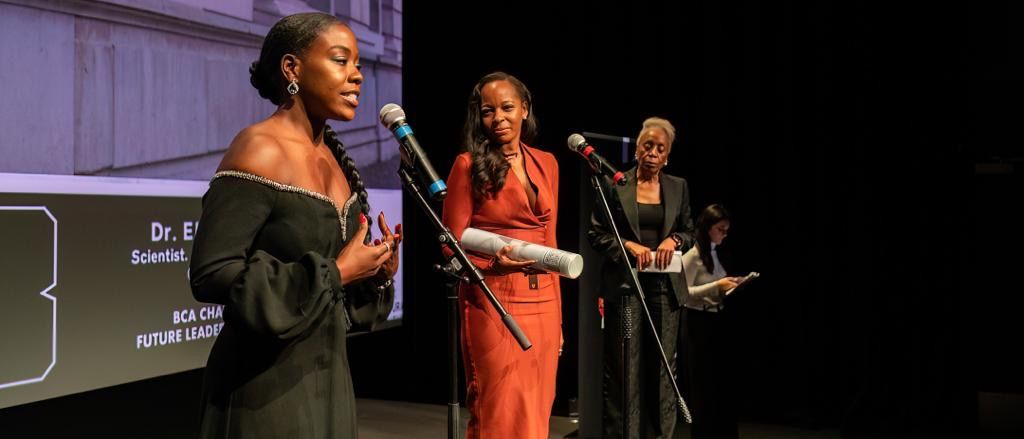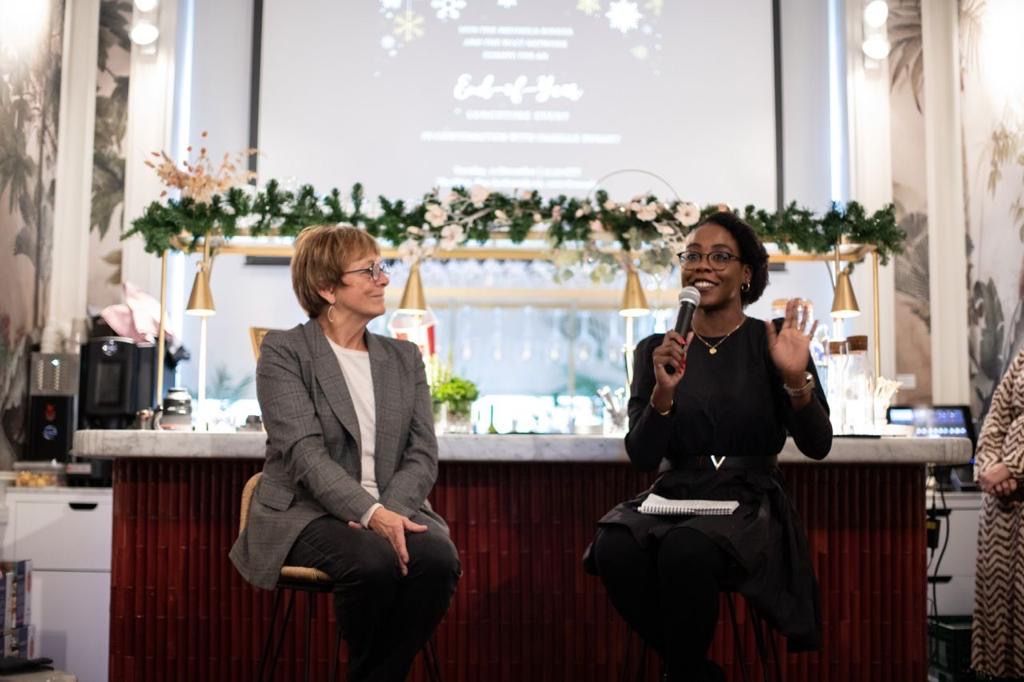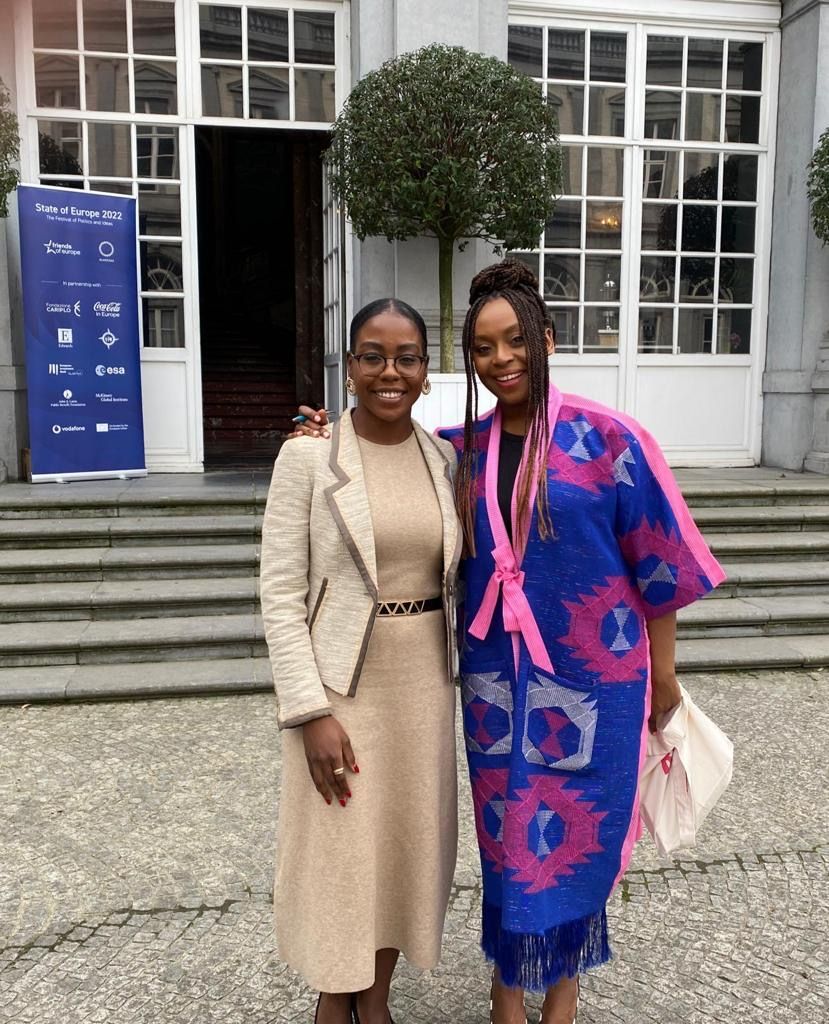- Women
Elsa Zekeng: Responding to Africa’s Health Crises Without Foreign Aid
- The Africa-Europe Foundation

Elsa Zekeng is an inspiring young researcher, entrepreneur, and advocate from Cameroon who joined the pool of young experts within the Africa Europe Foundation to advance a just and equitable partnership between the two continents and unleash the potential of Africa in achieving its 2063 Agenda.
To follow her dream of becoming a distinguished researcher, Elsa moved to the UK fifteen years ago to advance her studies. She holds a Ph.D. in biology and infectious diseases, inspired by her mission to address the outbreak of infectious diseases across different African countries. Elsa aspires to contribute to a continent that can respond to global health crises without foreign aid. She is a role model to many African and European youth and an exemplary female figure whose sole purpose is to make an impact and create as many opportunities for vulnerable communities, women and girls as possible.
Elsa shares her journey to becoming one of the Top 50 most inspiring, prominent, and influential black voices in UK Tech and receiving a medal from the Queen for exceptional work in Guinea, Africa, during the Ebola outbreak, among other achievements.



“Elsa aspires to contribute to a continent that can respond to global health crises without foreign aid.”
Looking back at your journey, what has been your most significant achievement so far?
First was the biggest Ebola virus outbreak in West Africa. The WHO, Public Health England deployed the European Mobile Laboratory and me to Guinea, Coyah, to support the testing and tracking of the Ebola virus. During this period, I spent 6-weeks working with a team of five, whereby we tested samples for Ebola and Malaria, working 12–14 hours a day, seven days a week, and frequently lost track of days.
The results we obtained were directly fed to the epidemiology team for further tracing of potential contacts. As a fairly young scientist, this experience established a scientist's crucial role during outbreaks, as we recently experienced through the COVID-19 pandemic. After that, I completed my PhD in Infectious Disease and Global Health, and my passion and curiosity to play an active role was born. Although it has taken various forms, the sector was ignited and has never changed.
Secondly, due to a series of unfavorable events in Guinea, I began blogging about the significant role played by policies in creating a new favorable reality or perpetuating unfortunate realities. As such, I shared my viewpoint from being on the ground during the Ebola outbreak, after which I was selected as a European Development Days Young Leader.
In addition, I participated on a high-level panel at the European Development Days 2016 alongside decision-makers such as Mark Dybul, former Global fund director, and Christiaan Rebergen, then Deputy Director for International Cooperation, Ministry of Foreign Affairs, The Netherlands. The discussion highlighted Sustainable Development Goal 3: Universal healthcare for all.
While this topic was broad, I leaned explicitly on my experience in Guinea, underscoring the critical role of policies in:
a) Creating equal partnerships between organizations in Scientific R&D,
b) Encouraging the inclusion of stakeholders who would be directly affected by the outcomes of these partnerships,
c) Increasing access to funding for scientific R&D, especially for institutions in the 'Global South' (Africa or Latin America) in an equitable manner, and so much more.
What has been your current biggest concern?
As a result of the experiences mentioned above, organizations frequently invite me to advocate or speak on topics around Equality, Diversity, and Inclusion within science or politics. Of course, several groups are marginalized, but I advocate for women, black and ethnic minority communities, and youth.
Through these, I am often asked questions such as 'How do we engage youth?", "How do we include black and ethnic minorities?" "How do we fund research that is not historically funded?" "How do we ensure more women apply for our roles?"
This thought comes to mind during these instances: "I don't think I am the one to answer that question." However, my response is that institutions and organizations must ensure their internal policies can support the answers to these questions. I thoroughly believe, if committed, engaging these groups of the population is relatively straightforward. Nonetheless, what becomes more complex are our internal policies.
So, my biggest concern now is time. How long will it take us (collectively) to implement the change, policies, etc., that we know is needed?
“My biggest concern now is time. How long will it take us (collectively) to implement the change, policies, etc., that we know is needed?”
What support have you received that has been critical in your journey and which should be amplified?
The support I never knew I needed are the Sponsors, champions and advocates I have met throughout my career. These include peers and people much more senior than me who have said my name in rooms when I wasn't present.
Through the AEF, I gained so many people in this form as champions and advocates who saw and acknowledged the work I have done and continue to do and went on to champion my work and myself in innumerable ways. Examples include inviting me to speak on panels, moderate events, and even conduct this interview. I believe you cannot put a price on and I value that.
What goals have you set for yourself this year?
Increase my contribution to the scientific and business field as a science entrepreneur. I look forward to discussing its implementation later.
What role have entities such as AEF played in supporting your work?
AEF is a master aggregator, a platform of platforms with the ability to connect several relevant stakeholders. This allows the private and public sectors to move away from operating in silos towards partnerships and collaborations. The platform provided has been crucial to my work, considering I sit at the intersection of science, entrepreneurship, and policy. AEF allows these worlds to collide meaningfully, leading to changed outcomes.